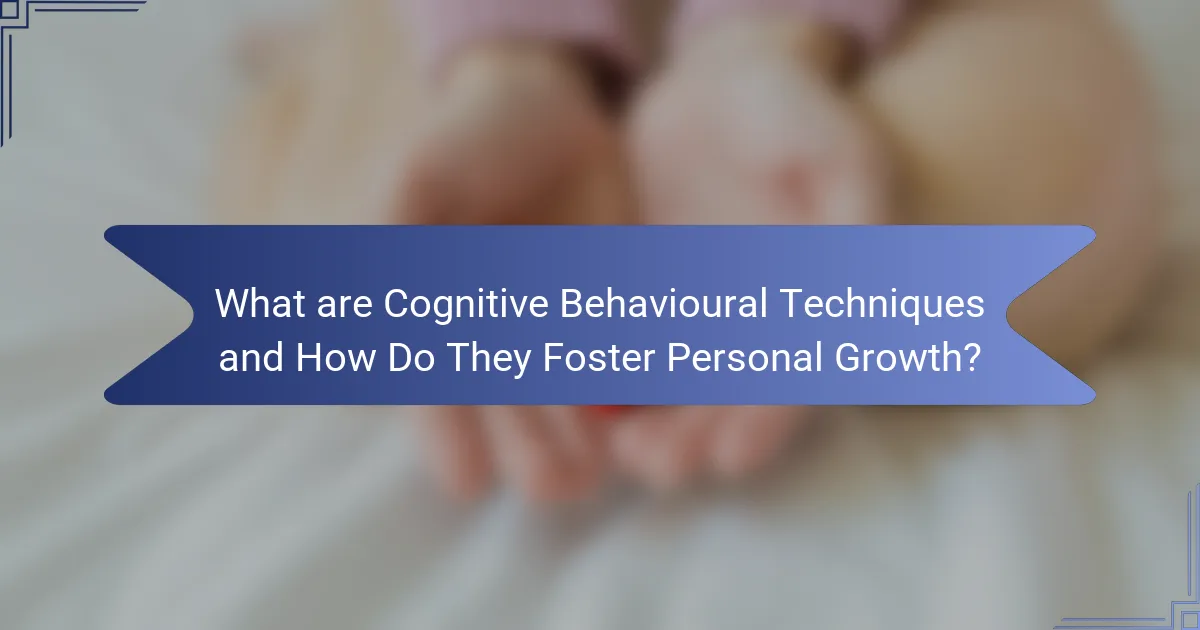Trusting yourself is essential for building self-confidence and resilience. This article explores cognitive behavioural techniques that enhance self-awareness, challenge negative thoughts, and promote a growth mindset. It also highlights how self-reflection and emotional regulation contribute to long-term resilience. Finally, practical steps will be provided to cultivate self-trust and foster personal growth.

What are Cognitive Behavioural Techniques and How Do They Foster Personal Growth?
Cognitive behavioural techniques empower individuals to build self-trust, enhancing personal growth and resilience. These methods focus on changing negative thought patterns, promoting healthier behaviours, and fostering a growth mindset. Techniques such as cognitive restructuring and behaviour activation help individuals identify and challenge limiting beliefs, leading to improved self-esteem and emotional regulation. As a result, practitioners often experience increased motivation and a greater sense of control over their lives. Engaging regularly with these techniques can cultivate lasting resilience and personal development.
How do cognitive distortions impact self-trust?
Cognitive distortions undermine self-trust by distorting reality and fostering negative self-perceptions. They lead to patterns of thinking that reinforce doubt and insecurity. For example, all-or-nothing thinking can cause individuals to view themselves as failures after a single mistake. This impacts decision-making and resilience, making personal growth challenging. Addressing these distortions through cognitive behavioural techniques can rebuild self-trust and enhance emotional well-being.
What role does self-awareness play in cognitive behavioural approaches?
Self-awareness is crucial in cognitive behavioural approaches as it enables individuals to recognize their thoughts, emotions, and behaviours. This recognition fosters personal growth and resilience by facilitating the identification of negative patterns. By understanding these patterns, individuals can implement cognitive restructuring techniques to challenge and change maladaptive thoughts. This process enhances emotional regulation, leading to improved mental well-being and effective coping strategies. Ultimately, self-awareness empowers individuals to trust themselves and make informed decisions, reinforcing their personal development journey.
How can reframing thoughts enhance resilience?
Reframing thoughts enhances resilience by shifting perspectives and fostering a positive mindset. This cognitive behavioural technique helps individuals view challenges as opportunities for growth. By recognizing negative thought patterns, one can replace them with constructive alternatives, leading to improved emotional responses. Research indicates that reframing can reduce stress and increase adaptive coping strategies, ultimately strengthening resilience.
What are effective methods for identifying negative thought patterns?
Identifying negative thought patterns involves self-reflection and cognitive behavioural techniques. Start by journaling your thoughts to pinpoint recurring negative themes. Use thought records to challenge these patterns by questioning their validity. Engage in mindfulness practices to increase awareness of your thoughts. Seek feedback from trusted individuals to gain perspective on your thinking.
How can positive affirmations be utilized in cognitive restructuring?
Positive affirmations can significantly enhance cognitive restructuring by promoting self-trust and resilience. By consistently repeating positive statements, individuals can challenge negative thought patterns and reinforce a more optimistic mindset. This practice can lead to improved emotional regulation and a stronger sense of self-efficacy. As a result, individuals may experience reduced anxiety and increased motivation, facilitating personal growth.

What are the Universal Benefits of Trusting Yourself?
Trusting yourself fosters self-confidence, enhances decision-making, and promotes resilience. By harnessing cognitive behavioural techniques, individuals can effectively manage negative thoughts and develop a growth mindset. This self-trust leads to improved emotional well-being, greater adaptability in challenging situations, and stronger interpersonal relationships. Ultimately, trusting yourself empowers personal growth and resilience in various aspects of life.
How does self-trust influence decision-making?
Self-trust significantly enhances decision-making by fostering confidence in one’s judgment. When individuals trust themselves, they are more likely to take decisive actions and embrace responsibility for their choices. This confidence reduces anxiety, allowing for clearer thinking and better problem-solving. Additionally, self-trust encourages a growth mindset, promoting resilience in the face of challenges. As a result, those who cultivate self-trust often experience improved outcomes and personal satisfaction in their decisions.
What are the psychological benefits of increased self-confidence?
Increased self-confidence provides psychological benefits such as improved resilience, better decision-making, and enhanced relationships. Trusting yourself fosters a positive mindset, enabling you to tackle challenges effectively. As a result, individuals often experience reduced anxiety and increased motivation. Research indicates that self-confidence correlates with higher performance levels in various life areas, including work and personal relationships. Embracing cognitive behavioural techniques can further amplify these benefits, leading to sustained personal growth.

What Unique Attributes Enhance the Practice of Self-Trust?
Self-trust is enhanced by unique attributes such as self-awareness, resilience, and cognitive reframing. Self-awareness allows individuals to recognize their emotions and thoughts, fostering better decision-making. Resilience enables the ability to bounce back from setbacks, reinforcing trust in oneself. Cognitive reframing offers new perspectives on challenges, transforming negative thoughts into opportunities for growth. These attributes collectively strengthen self-trust, promoting personal growth and resilience.
How can goal-setting techniques improve self-trust?
Goal-setting techniques enhance self-trust by providing a clear framework for personal accountability. They foster a sense of achievement as individuals meet specific, measurable objectives. This process builds confidence and reinforces a positive self-image. Moreover, setting realistic goals encourages resilience, allowing individuals to navigate challenges effectively. By tracking progress, individuals can reflect on their capabilities, further strengthening their trust in themselves.
What specific cognitive behavioural strategies can be tailored to individual needs?
Cognitive behavioural strategies can be customized to individual needs through techniques like cognitive restructuring, behavioural activation, and exposure therapy. These methods help individuals challenge negative thoughts, engage in positive activities, and confront fears. Personalization involves assessing specific triggers, goals, and coping styles. For example, cognitive restructuring can focus on reframing thoughts related to self-doubt, while exposure therapy can be tailored to specific phobias. Adapting these strategies enhances effectiveness and promotes personal growth.

What Rare Attributes Contribute to Long-Term Resilience?
Self-trust significantly contributes to long-term resilience by fostering confidence and adaptability. Rare attributes enhancing this resilience include self-reflection, emotional regulation, and a growth mindset. These attributes enable individuals to navigate challenges effectively, learn from experiences, and maintain motivation over time. Research indicates that individuals who engage in regular self-reflection demonstrate higher resilience levels, as they can adjust their strategies and beliefs in response to setbacks. Emotional regulation allows for better stress management, while a growth mindset encourages viewing challenges as opportunities for development.
How does cultivating emotional intelligence support self-trust?
Cultivating emotional intelligence significantly enhances self-trust by fostering self-awareness and self-regulation. Emotional intelligence allows individuals to recognize and understand their emotions, leading to better decision-making. As a result, heightened emotional awareness builds confidence in one’s judgments and actions. This process reinforces the unique attribute of self-trust, as individuals learn to rely on their emotional insights. Furthermore, emotional intelligence promotes resilience by equipping individuals to navigate challenges with a balanced perspective, ultimately supporting personal growth and fostering a deeper sense of trust in oneself.
What uncommon practices can reinforce personal resilience?
Trusting yourself through cognitive behavioural techniques can significantly enhance personal resilience. Uncommon practices include journaling to identify thought patterns, engaging in self-compassion exercises, and utilizing visualization techniques to foresee positive outcomes. These methods foster a deeper self-awareness and promote adaptive thinking. Incorporating mindfulness meditation can also help in managing stress and enhancing emotional regulation. Regularly challenging negative beliefs through reframing can further solidify resilience and personal growth.
How can journaling enhance self-reflection and growth?
Journaling enhances self-reflection and growth by promoting clarity and emotional processing. It allows individuals to articulate thoughts, identify patterns, and set personal goals. This practice encourages accountability and fosters resilience through cognitive behavioural techniques. Regular journaling can lead to improved mental health and increased self-awareness.
What role does community support play in building resilience?
Community support is essential in building resilience as it fosters a sense of belonging and shared experiences. Supportive networks provide emotional encouragement, practical assistance, and a platform for sharing coping strategies. This connection enhances individual confidence and promotes adaptive behaviours in challenging situations. Research indicates that social support can significantly mitigate stress and improve mental health outcomes, reinforcing the importance of community in personal growth and resilience.

What Practical Steps Can You Take to Trust Yourself More?
To trust yourself more, practice cognitive behavioural techniques that promote self-awareness and resilience. Start by identifying negative self-talk patterns and challenge them with evidence-based reasoning. Set achievable goals to build confidence gradually. Engage in mindfulness exercises to enhance self-reflection and emotional regulation. Additionally, surround yourself with supportive individuals who encourage personal growth. Consistent practice of these techniques fosters a stronger sense of self-trust.
How can you implement cognitive behavioural techniques in daily life?
To implement cognitive behavioural techniques in daily life, start by identifying negative thoughts and challenging them. Use thought records to track these thoughts and their triggers. Practice reframing these thoughts into more positive or realistic ones. Set specific, achievable goals to reinforce positive behaviours. Incorporate mindfulness exercises to enhance self-awareness and emotional regulation. Regularly review your progress to build resilience and trust in your ability to change.
What are common mistakes to avoid when practicing self-trust?
To build self-trust, avoid common mistakes that undermine your confidence. One major mistake is ignoring negative self-talk, which can erode your belief in your abilities. Another is failing to set realistic goals, leading to discouragement. Additionally, neglecting self-reflection prevents you from learning from past experiences. Lastly, comparing yourself to others can diminish your self-worth. Focus on personal progress instead.
What expert insights can guide your journey towards resilience?
Trusting yourself is vital for resilience. Cognitive Behavioural Techniques (CBT) can help you develop this trust through practical strategies. Start by identifying negative thought patterns and challenging them. Replace these thoughts with positive affirmations to foster a growth mindset. Regular practice of mindfulness can enhance self-awareness, allowing you to respond rather than react to stressors. Engaging in problem-solving exercises can also build confidence and resilience over time.
How can you track your progress in building self-trust?
To track your progress in building self-trust, regularly reflect on your decisions and feelings. Document instances where you acted in alignment with your values and goals. Assess your emotional responses to these actions to identify patterns of trust. Set measurable goals for self-trust development and review them weekly. Celebrate small successes to reinforce positive behaviour.
What resources are available for ongoing personal development?
To support ongoing personal development, consider various resources that leverage cognitive behavioural techniques. Books like “Feeling Good” by David Burns provide practical exercises. Online courses on platforms like Coursera or Udemy offer structured learning. Support groups or therapy sessions enhance resilience through shared experiences. Journaling can track progress and reinforce positive thinking.